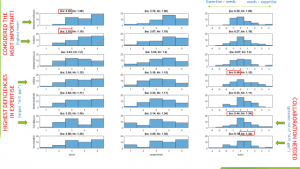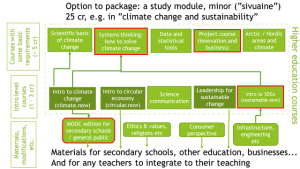In this post we’ll an update on the Climate University needs assessment
Starting point: what are the skills needed to solve the grand challenges of climate change and sustainability?
One of the main aims of the Climate University project is to produce new educational materials based on the needs of the Finnish higher education field. The selection of materials is based on what materials are most needed in climate and sustainability education in Finnish universities. In addition to wholly new materials we will produce smaller additions to the popular Climate.now (http://www.climatenow.fi/ ) To support the decisions on selection of materials, a needs assessment was conducted earlier this year.
In November 2018, we held the first kick-off workshop in Tiedekulma, at the University of Helsinki. The opening theme in the kick-off workshop was to examine the question of
“What kind of expertise (education) is needed in the near future, in order to answer the challenges of climate change and sustainability?”
After an interactive urban orienteering –themed interview of experts from various branches of the Finnish society, the workshop participants had a lively discussion on what the relevant skills and areas of expertise would be. Summarised, the main areas considered crucial for future education in the discussion were:
- Multi-disciplinarity – crossing the traditional borders of natural (or technical, engineering) vs human (sociological) sciences is necessary
- Holistic understanding of the challenges is required and systems thinking is important. It is important to try to see the bigger picture and not look at the challenges from a single, narrow angle
- Impactful decisions are based on data and statistics, to but it is equally important to keep in mind the personal, human perspective (choices, values, ethics, principles) and create an emotional connection to the challenges, to bring about change in the society
- Values and ethics should be included in the discussion of climate change and sustainability.
- Science communication is key. Academic knowledge needs to be communicated to the decision makers, but academics equally need to understand political decision-making
- Including the private sector and markets in answering the challenges and considering finances and the economics is needed, and (green technology) business opportunities and innovations need to be recognized. However, focusing too much on innovations and technical solutions may hinder grasping the bigger picture of the challenges.
- Consumer perspective is important to consider – green choices need to be made easy. Sustainability education (in e.g. circular economy) in schools is necessary, to educate responsible citizens and customers of the future.
Specifically, we were urged by the participants not to fall for “silo mentality” or to classify materials of questionnaire themes by typical topical classifications. Therefore, the above listed themes were adopted as the basis for themes charted in the needs assessment questionnaire. Based on the project plan and the kick-off workshop feedback, both described above, a survey form was drafted. The survey was implemented using an online questionnaire and was answers were collected from January to March 2019.
The needs assessment survey: what did we as a community find important?
The survey received in total 49 responses. Most of the responses were from University personnel, which is the largest group of people forming the Climate University community. The respondents backgrounds were distributed rather evenly among the Finnish universities and the respondents generally represented more than one faculty or department at each university. Additionally to the universities’ representatives, we received multiple answers from other sections of the society such as schools, NGO’s and government institutes.
Statistics
In the “Materials” section of the questionnaire we asked the respondents to evaluate (i) the levels of need for materials and (ii) the respective expertise in their potential production in their organisation. The question included a numeric answer on a scale of 1 to 5 to each of the seven themes selected as well as a freeform additional comment (optional). The distribution of answers by the themes is shown below:

In addition to the averages and standard deviations of the numerical answers, we additionally calculated the difference between the need and expertise reported by the participants. This difference, which we here labeled “skill gap” can be taken to represent the need of outside expertise (or similarly the capability to offer expertise to others, if expertise > need; i.e. skill gap is negative). Please note this calculation is not a robust scientific one, but rather arbitrary metric we derived to have at least some measure for the overall balance of needs and expertise, as well as a measure of need for collaboration between the various universities.
From the statistics, we proposed three conclusions can be drawn:
- The overall demand is highest (mean of ‘need’) for the two themes as of multi-disciplinarity and holistic understanding.
- For the themes of ethics and values and consumer perspective, the discrepancy between estimated need and expertise (mean skill gap) is the highest, indicating an overall lack of expertise on these topics among the participating organisations.
- The consumer perspective and private sector and markets themes feature the widest distributions (highest standard deviation) of ‘skill gap’, which we propose could be taken as a sign that co-operation between the organisations would be especially beneficial in these topics.
Freeform comments
Of the themes offered, multi-disciplinarity and holistic understanding gathered the largest amount of supporting comments and propositions, e.g.:
“Especially in the technical areas, we need to be exposed to a view of the whole and how our endeavours fit in to healing the human condition and the planet!”
“I think we could make use of more material/cases on the holistic understanding of reasons behind climate change”
“Ilmastonmuutos systeemiajattelun valossa”
“Risk assessment, perception and communication”
The themes of consumer perspective, science communication private sector and markets also well represented among the comments:
“How to cooperate with companies and other organizations on climate issues: project work module” (Private sector and markets)
“New technological innovations emerging from the need to cut down carbon emissions – dealing with energy production, mobility solutions and businesses” (Private sector and markets)
“Not very much integrated to present curriculum? Is of great importance.” (Science communication)
“Miten nostaa ilmastoaihe vakavaan keskusteluun monialaisessa ja kiireen vaivaamassa organisaatiossa? Miten puhutellaan johtoa tehokkaasti? Miten saadaan organisaatiosta irti parhaat tehot ilmastokysymyksessä?” (Science communication)
“reasoned discussion on how encouraging individual choices might spill over into demands on better regulation – instead of mutual stand-still & wait” (Consumer perspective)
“Yes, this is important but why do we still want to talk about customers and consumers? People are becoming producers, and individuals’ role should be rethought.” (Consumer perspective)
Outside of the pre-selected themes, multiple respondents suggested in the freeform comments that a basic course on sustainability would be needed:
“Basics of sustainability e.g. based on planetary boundary and donut approaches. Explanations on each of the themes presented in both approaches.”
“Introduction to Sustainability: We propose a on-line course “Introduction to Sustainability” to provide comprehensive basic/starting knowledge and skills for master students with various backgrounds.”
“On behalf of research group LUT/School of Energy Systems/Sustainability Science: Digital course “Introduction to Sustainability” to provide an overview of the variety of sustainability issues related to natural resources, technologies, sustainable and profitable business models, climate changes, food and water, systemic thinking etc.”
Summarising the survey results – the main conclusions:
- – Themes considered most important: inter-disciplinarity and holistic understanding
- – Sustainability (introductionary) course was mentioned and wished for many times!
- – Topics that got several mentions, and align well with project goals: Industry / business collaboration and school collaboration
- – Science communication raised many positive comments and was seen as important
- – Other possible topics for smaller materials include for example
- Climate change in Arctic/ Nordic areas, Ethics & values, Consumer perspective & active citizenship, Climate Law and
- Data basis
Further developing the ideas
In the second Climate University workshop, held at the University of Jyväskylä 28.-29. March 2019, the results so far from the questionnaire were presented to the wider Climate University community.
From the basis of the survey result and discussion in the workshop, we decided to go forward with two main themes: (1) Introduction course to sustainability and (2) an ambitious, advanced course of systems thinking for unde4rstanding global change. We also decided to pursue smaller courses / materials for school and private sector co-operation, namely (3) a high school level online course based on Climate.now and (4) a project course based on working life challenges from industry and other collaborating partner organisations. There were also several ideas for smaller materials, the ideas of which we decided to refine.

The preliminary concepts for the four primary materials were discussed in small working groups in a session of the Jyväskylä workshop. Based on the survey results and preceding discussion, the groups discussed the concepts and summarized their ideas in form of quick posters. These ideas will add to the material available for further refinement of the course and material concepts.
To be continued…
Working groups have now been assigned for preliminary planning and refining of the ideas, and we will give an update of the progress at the next workshop in Turku, in May 7 to 8th. You are most welcome to discuss these materials and interesting themes with us!
